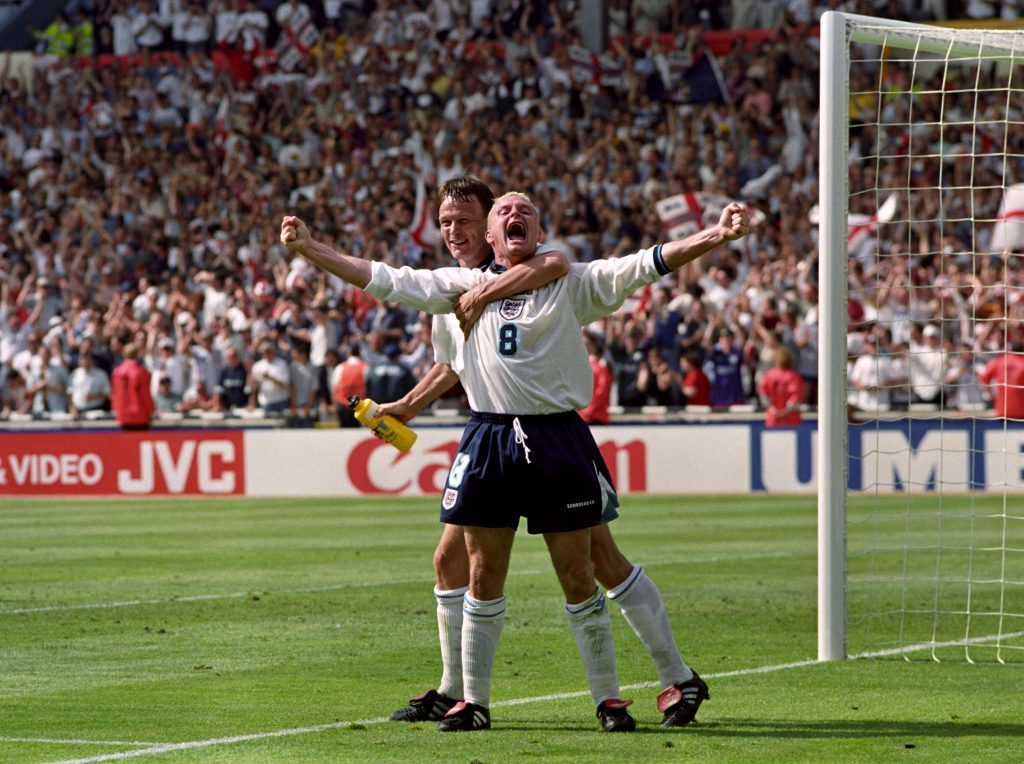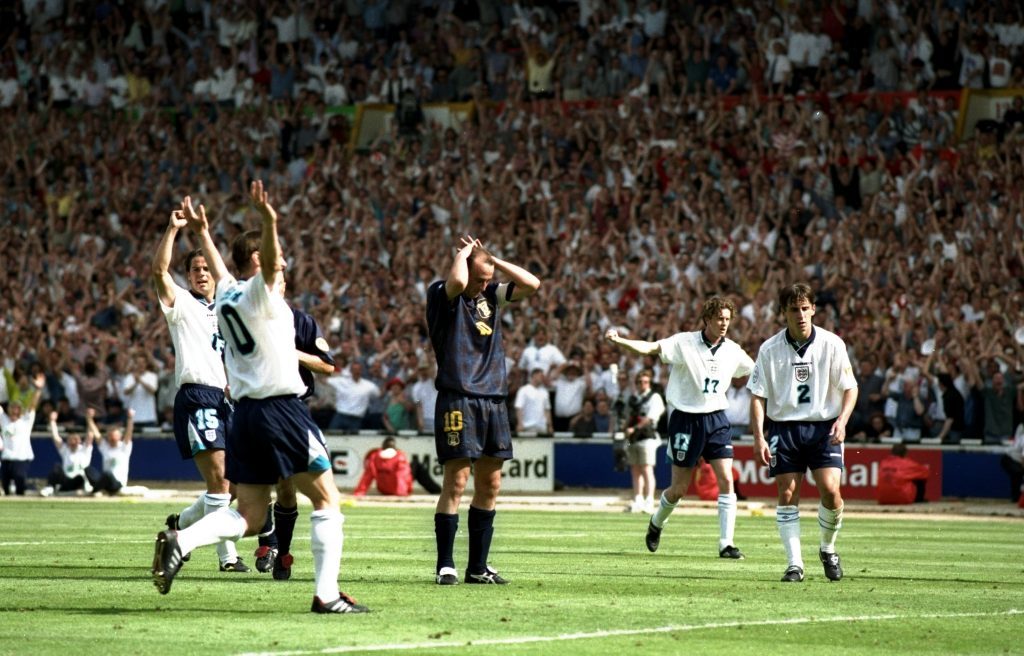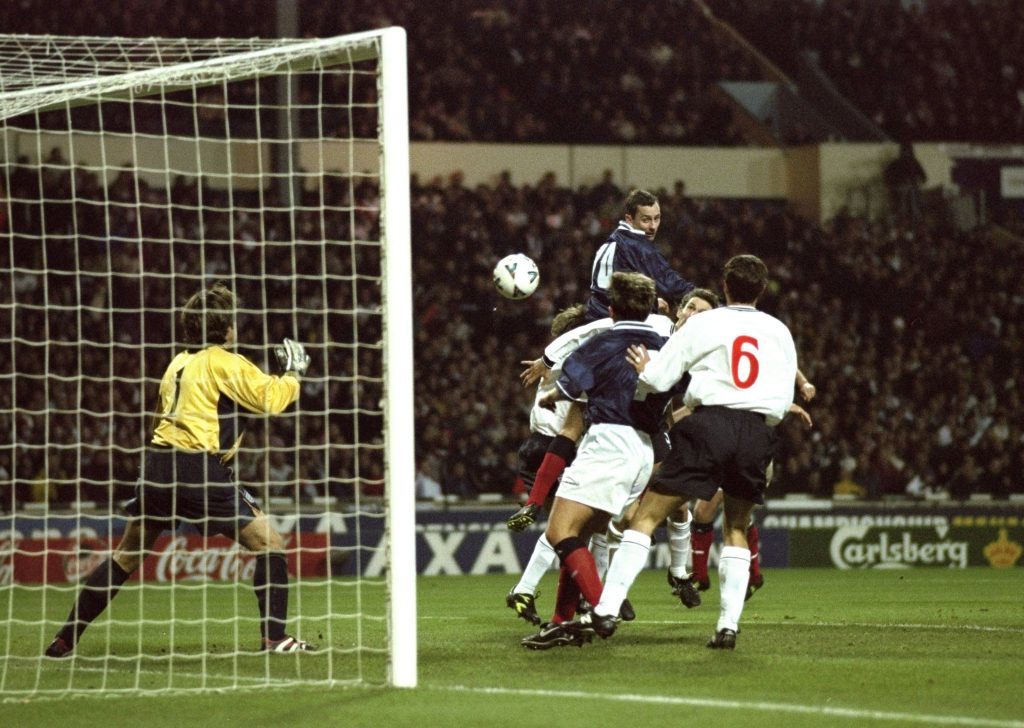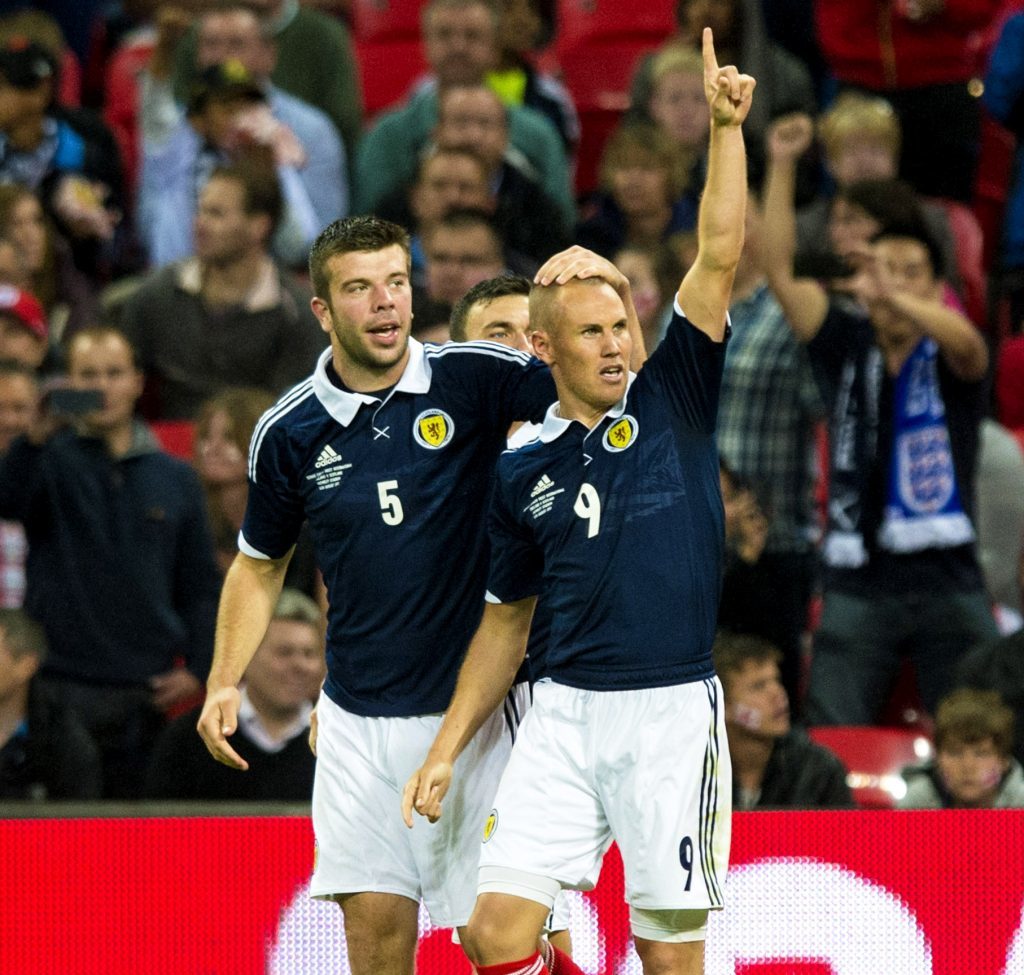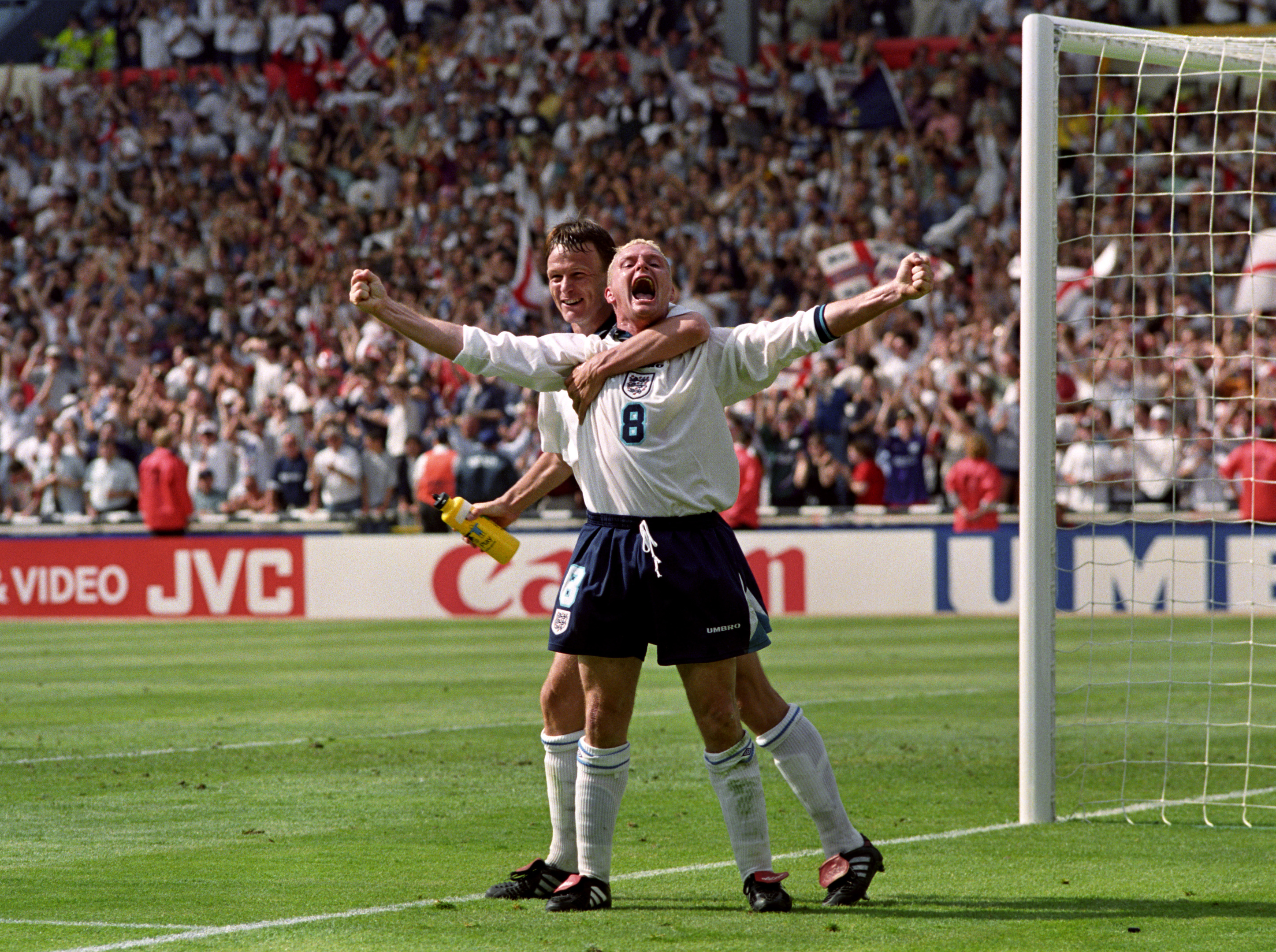

Gazza was about to be subbed before hitting his wonder goal
IT was always going to be Gazza.
After the build-up, the booze, the Hong Kong dentist’s chair, and the resultant screaming headlines, if anyone was going to break Scottish hearts at Wembley in 1996, it was going to be him.
Scotland were 1-0 down to the Auld Enemy, there was just over 10 minutes to go and our future in the European Championship Finals was on the line.
Alan Shearer had given the hosts the lead early in the second half, but the visitors were holding their own in the blistering heat of that mid-June afternoon.
And in the immediate aftermath of Gary McAllister’s penalty miss, Paul Gascoigne’s strike was devastating.
The insane deftness, the almost extra-terrestrial virtuosity of his first touch, and the way Colin Hendry – a man dubbed “Braveheart” – hit the deck hopelessly beneath it, feet flailing wildly, plunged an entire nation into an unwitting state of pre-mourning.
As Hendry fell, hands flew to heads, and eyes were clenched shut in pubs and houses from John o’ Groats to Gretna Green, as if to deny what was clearly about to
happen, as if to somehow prevent it.
As if.
Gazza, eyes locked on to the ball, watched it all the way to the laces of his right boot, then lashed it, full on the volley, past Andy Goram and into Wembley folklore.
But it almost never happened at all.
For Craig Brown, Scotland’s manager that day, the knowledge of how close Gascoigne came to being denied his moment hit like a punch in the gut delivered by the Geordie’s infamous pal, Jimmy “Five Bellies”.
But 20 years on from Euro 96, all that remains is respect for the English star who seized his moment and denied us ours.
“With Gascoigne, it’s almost as if he is the one man you don’t mind being at the centre of it all,” said Brown.
“I don’t mean I’m glad it happened. Far from it. It was a very disappointing result for us.
“But Paul was such a thoroughly nice man, and such a terrifically talented player – and, of course, with the links to our squad through Rangers – that its impact seems to have softened a wee bit over the years.
“Funnily enough, he wasn’t having a great game that day up until he scored. He wasn’t making the same impact he usually did.
“In fact, I remember looking across at the England bench not long beforehand and I could see Don Howe, Terry Venables’ assistant, making preparations to bring on a midfielder.
“I leant over to my assistant, Alex Miller, and said: ‘Here, Alex, they’re going to take Gazza off!’
“That would have been a big change for them. Of course, just as it’s all looking like happening, we then miss our penalty and he goes straight up the other end and scores.
“You can’t script that sort of thing. I just wish they’d got moving on the bench a wee bit quicker than they did!”
You and the whole of Scotland, Craig.
By Sean Hamilton
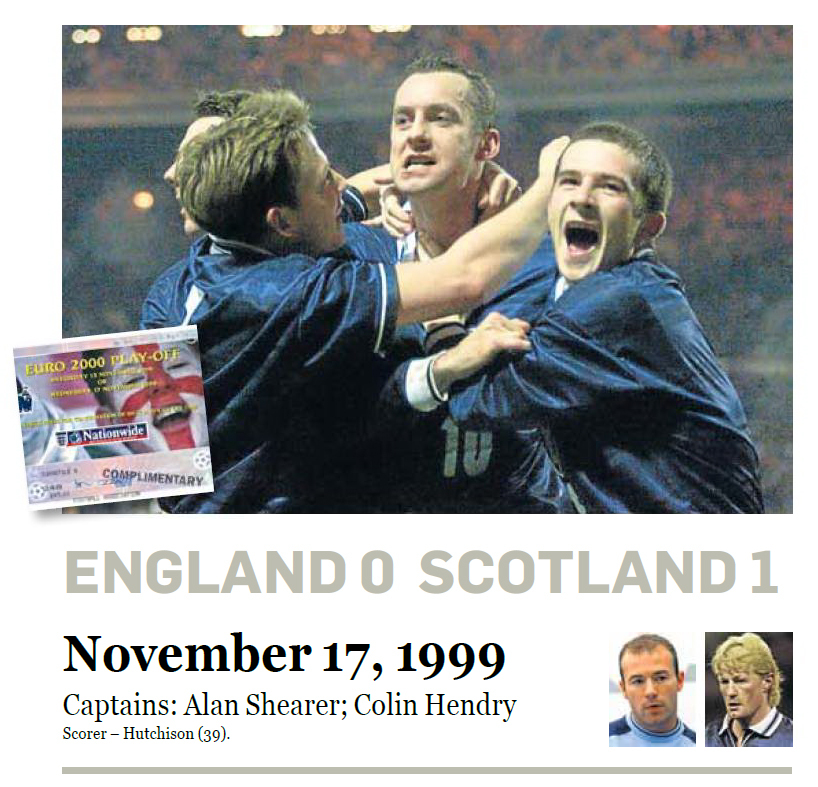
Dad’s tears said it all for Don
PRIDE and pain don’t often go hand in hand.
But for Don Hutchison, the defining moment of a distinguished career is shot through with both – along with a hefty dose of irony.
Wednesday, November 17, 1999. Scotland’s last-ever visit to the soon-to-be-demolished Twin Towers.
After a devastating 2-0 defeat at Hampden four days before, Scottish hopes of reaching Euro 2000 dangled by the faintest of play-off threads.
Craig Brown’s side needed to step up and shut down England’s superstars on their own patch – then they needed to go for the jugular.
We needed a talisman, a hero, a Braveheart.
And in the nation’s hour of need, up stepped Hutchison, the Englishman who grew up dreaming of playing for Scotland.
Half-time was seven minutes away when Christian Dailly threaded a perfect ball to Neil McCann.
McCann left makeshift England right-back Sol Campbell sprawled on the turf in his wake, hit the by-line, and floated a tantalising left-footed cross to the edge of the six-yard box.
It hung there for a seeming eternity, England’s panic-stricken defence mesmerised beneath it, just begging to be buried.
Hutchison didn’t hesitate.
As the flat-footed Tony Adams flailed, Scotland’s unlikely saviour soared to send a towering header into the net off David Seaman’s desperately-dispatched right hand.
For a player who grew up in Gateshead with pictures of Kenny Dalglish and Denis Law on his bedroom wall, it remains an all-time career high-point.
A tearful, full-time hug from his Nairn-born father in the Wembley tunnel made it even more special.
But even now, almost exactly 17 years on, Hutchison can vividly recall the devastation that hit home almost immediately.
He entered a Scotland dressing room struggling to come to terms with the fact that their 1-0 victory was not enough.
“It’s probably the goal I get asked most about,” says Hutchison, without even a hint of weariness.
“It’s incredible how the time has flown by since that night, but I still remember it like it was yesterday.
“I remember the build-up to it, I remember arriving at Wembley, I remember Craig Brown’s team talk, I remember hearing Flower Of Scotland – I remember everything.
“Scoring that goal is my proudest moment on a football pitch. That will never change. I was absolutely buzzing after it.
“I remember coming into the tunnel after the game and seeing my dad. He was a big, strong man, a 6ft 4in miner, hard as nails – and he had a tear in his eye.
“I gave him a little hug and my adrenaline was going, I was as high as a kite, but when I walked into the dressing room and saw all the lads in tears, that’s when it hit me.
“My goal, the result, it didn’t matter because we didn’t qualify over the two legs. I went from buzzing to heartbroken in the blink of an eye, really.
“You don’t ever forget something like that.”
If it were needed, Don’s goal also won him the respect of the Tartan Army, a group that has always been suspicious of English-born players.
In Don’s case, they needn’t have worried.
“I wasn’t conflicted about facing England at all – it wasn’t even remotely an issue for me,” he says.
“When I was growing up, all the pictures on my wall were of Scottish players. When I was out playing football with my dad, I was imagining playing for Scotland.
“That’s the way he was, my dad was a proud Scotsman, and there was never a doubt for me, even when I was playing well for Liverpool, that I would end up playing for Scotland.
“I got a ‘B’ cap at that time and I was committed from that day on. I had to wait five years after that for my first proper cap, but it was worth it.
“Seeing my dad after the game at Wembley, the fact that I’d scored to help Scotland beat England meant the world to him – and it meant the world to me too.”
By Sean Hamilton
What a way for Kenny to go out
KENNY MILLER didn’t deliver a win over England on his farewell appearance for Scotland.
But the striker’s Wembley sign-off was a moment to be treasured nevertheless.
With the countries not having met for 14 years, the 2013 fixture – held as part of the FA’s 150th anniversary celebrations – was eagerly anticipated on both sides of the border.
A crowd of 80,485 watched the hosts edge a breathless encounter in which Scotland led twice only to eventually go down 3-2.
The pick of the goals belonged to Miller, who took to the park knowing his 69th cap would also be his last.
Collecting a pass just inside the England penalty box and with his back to goal, he lost marker Gary Cahill with a feint to turn right before spinning on to his left and smashing a low shot just inside the post.
“I love that goal – I must have watched it hundreds of times,” said Miller.
“Sometimes when you are playing you are doing things purely on instinct, reacting to the situation.
“With that one, though, every bit of it – the movement, the awareness of where the defender was, my touch and the shot itself, was deliberate and under control.
“So, while I have been fortunate enough to be responsible for a few decent looking goals in my time, that one is right up there for me.”
Not least because of the personal significance the game held for him.
“I was 33 years old at the time, playing for Vancouver Whitecaps in the MLS and the logistics of also being a part of the Scotland set-up were proving impossible,” he said.
“It wasn’t fair on my club and it wasn’t fair on myself because I was picking up a few injuries around that time and I am sure all the travelling was partly to blame.
“So, I had spoken to Gordon Strachan a few weeks earlier and he had said: ‘Listen, we have Wembley coming up, you’ll want to be part of that one, stay until then’.
“I agreed and it was terrific. It was the first meeting for a long time and the atmosphere was amazing.”
With the football not too shabby either.
“Although it was only a friendly, there was a lot of professional pride at stake and both teams went for it,” Miller recalled.
“We played really well and I thought we deserved a draw at least and I know a lot of the other guys agreed.
“From a personal point of view, the result really was the only disappointment. I got a start and was happy with the way I played topped, of course, by a goal which gave me a lot of satisfaction.
“It was just a great way to sign off.
“I enjoyed every minute of the 12 years I played for Scotland and like to think I gave it everything I had, as I have always done throughout my career, regardless who I am playing for.
“There have been times since where I wished I hadn’t given up because I believed I could still have made a contribution.
“In fact, I still feel like that now, despite coming up for 37!
“I know the decision was taken for the right reasons, though, and I couldn’t really have asked for a better send-off.”
By Danny Stewart
<The 1970s & 80s | Home >

Enjoy the convenience of having The Sunday Post delivered as a digital ePaper straight to your smartphone, tablet or computer.
Subscribe for only £5.49 a month and enjoy all the benefits of the printed paper as a digital replica.
Subscribe